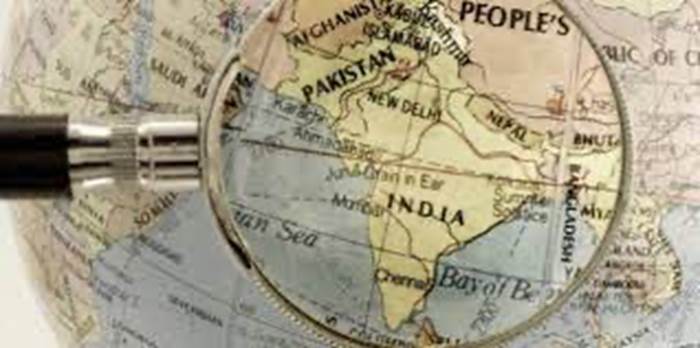Description

Copyright infringement not intended
Context: External Affairs Minister Dr. S. Jaishankar has said that in the last eight years, Prime Minister Narendra Modi always advocated for Neighbourhood First Policy. Participating in a discussion on Modi @ 20: Dreams Meet Delivery, Dr Jaishankar said, the vision of Modi Government is towards the development and prosperity of the entire neighbourhood.
Background:
- Peace and stability at the domestic, regional and global levels are closely related to the pursuit of the foreign policy of any country.
- Without enduring primacy in one’s own neighbourhood, no nation can become a credible power at the global stage.
- Since it assumed power in 2014, the Modi government has stressed the "Neighbourhood First" policy as an integral component of Indian foreign policy.
- The policy strives to build cordial and synergetic relations with its South Asian neighbours in various areas such as economy, science and technology, research and education, among others.
- India’s Neighbourhood First policy can also be seen as a manifestation of the Modi government’s vision of building a Vasudhaiva Kutumbakam (the world as one family).
- Neighbourhood First Policy of India, a core component of India's foreign policy, focuses on peaceful relations and collaborative synergetic co-development with its South Asian neighbors of the Indian subcontinent encompassing a diverse range of topics, such as economic, technology, research and education, connectivity (digital, surface and air transport, energy grid connectivity, logistic chains, etc), space program, defence security, environment and climate challenge.
- This policy creates new avenues as well as leverages existing regional cooperation initiatives, such as SAARC, SASEC, BBIN, and BIMSTEC.
- It complements India's Look East policy focused on Southeast Asia and Look West Policy focused on Middle East.
- Vaccine diplomacy and development assistance based on mutual respect and equal partnership are two of the most important pillars to catapult India’s Neighbourhood First policy.
- PM Modi started well by inviting all heads of state/heads of government of South Asian countries in his inauguration
- During a launch event at ISRO he has asked Indian scientists to take the endeavour to develop a dedicated SAARC satellite to share the fruits of the technology like tele-medicine, e-learning etc.
- Indian diplomacy, particularly during the Covid-19 pandemic, resulted in India being recognised on the world stage as a harbinger of hope providing necessary help to needy nations and their people globally.
- As part of India’s Neighbourhood First policy, India, through its vaccine diplomacy (Vaccine Maitri), extended help to many countries of the world and neighbouring countries during the Covid-19 pandemic
- Keeping with the spirit of Vasudhaiva Kutumbakam, India is also providing all possible help to Afghanistan and Sri Lanka to address their myriad challenges through its development assistance initiative.
- It is worth mentioning that since the Taliban came to power in Afghanistan, India has supplied wheat and other essential food items and Covid-19 vaccines as humanitarian aid to Afghanistan.
- In its budget for 2022-23, India has allocated an amount of INR2,000 million as development assistance to Afghanistan.
- The Indian government has allocated INR62,920 million in its budget for 2022-23 for development assistance to countries in India’s neighbourhood and Africa and Latin America. As part of the development assistance, the Indian government allocated INR22,660 million to Bhutan, INR7,500 million to Nepal, INR6,000 million to Myanmar, INR3,600 million to the Maldives, INR3,000 million to Bangladesh and INR2,000 million to Sri Lanka, respectively.
- Considering the ongoing severe economic crisis in Sri Lanka, India has agreed to provide a line of credit of $1 billion to Sri Lanka. Further, India sent fuel to Sri Lanka to deal with the power crisis. Apart from this, India also helped Sri Lanka with the supply of food grain to address the shortage of essential food commodities.
Way ahead:
- India’s necessary help to South Asian countries by prioritising neighbouring countries in its pursuit of foreign policy objectives, particularly by extending help to Sri Lanka and Afghanistan in their time of crisis, is a testimony to India’s importance to its Neighbourhood First policy.
- There are more reasons to push for the Neighbourhood First policy in the future:
- First, sustained engagement with the neighbouring countries will facilitate creating a cordial atmosphere in the region, which has been a constant impediment to establishing stability, trust and progress in the area. Stability will enable India to pursue its foreign policy goals and facilitate growth and development in other South Asian countries.
- Second, by extending necessary assistance, India can strengthen its position in the region and achieve both economic and strategic depth vis-à-vis China. Therefore, there is a greater need for sustained engagement with its neighbouring countries.
- Third, priority should be given to people-to-people connections and deep cultural affinities for sustained cordiality and stability. Further, focus should be given to prompt delivery of its commitments for the overall development of the region.
https://newsonair.gov.in/News?title=PM-Modi-always-advocates-for-Neighbourhood-First-Policy%2c-says-EAM-S.-Jaishankar&id=443669
1.png)










